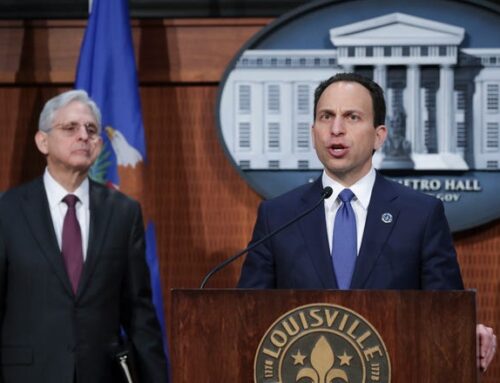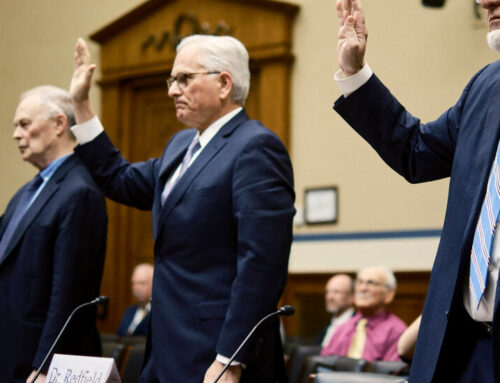This post was originally published on this site

Louisville police failed to protect Black people, inquiry launched after Breonna Taylor death finds
Merrick Garland condemns ‘unacceptable’ police conduct after review concludes officers violated residents’ civil rights
Louisville police engaged in unlawful practices that violated residents’ civil rights and discriminated against Black people and people with behavioral health deficiencies, the US justice department concluded on Wednesday following an investigation prompted by the killing of Breonna Taylor in a botched police raid in 2020.
The city of Louisville agreed to a consent decree to reform policing practices.
In March 2020, Taylor, 26 and an emergency medical technician studying to become a nurse, was roused from sleep by police who entered her apartment using a battering ram. Thinking it was a home invasion, Taylor’s boyfriend, Kenneth Walker, fired a gun once. Police opened fire, killing Taylor.
The no-knock warrant was part of a narcotics investigation. No drugs were found. A grand jury declined to charge officers. Civil rights charges were brought against four. The city agreed to pay $2m to settle suits brought by Taylor’s boyfriend, Kenneth Walker.
Coming shortly before the killing of George Floyd by officers in Minneapolis, Taylor’s death fueled protests against police brutality and for systemic reform.
The justice department’s civil rights division has now concluded that Louisville police and city government “failed to adequately protect and serve and discriminated against Black people” and deployed “unjustified neck restraints” and “unreasonable use of police dogs and Tasers”.
Announcing the findings, the US attorney general, Merrick Garland, said officers had “demonstrated disrespect for the people they were sworn to protect”, some videotaping themselves “throwing drinks at pedestrians from their cars, insulting people with disabilities, and calling Black people, ‘monkeys, animal and boy’.
“This conduct is unacceptable. It’s heartbreaking,” Garland said, in Louisville. “It erodes the community trust necessary for effective policing … it is an affront to the people of Louisville who deserve better.”
Police routinely engaged in “unjustified” no-knock warrants that defied federal law and put “ordinary citizens in harm’s way”, said Kristen Clarke, assistant attorney general for civil rights, adding that officers also sought “overly broad” warrants that swept up people with remote connections to suspected criminal activity.
Louisville police disproportionately stopped Black drivers for minor traffic offenses. Black drivers were twice as likely to be cited for having a taillight out as white drivers, four times as likely to be cited for improperly tinted windows and nearly five times as likely to be cited for improper tags.
Black drivers were also 50% more likely to be searched when stopped. Louisville police charged Black drivers at higher rates.
Disparate policing also influenced who was cited for non-violent offenses. Black residents were charged at higher rates than white people for the same misdemeanor offenses, Clarke said. The report noted that Black residents were four times as likely to be charged with loitering as white residents and roughly three times as likely to be cited for disorderly conduct and littering.
Clarke said police often responded “aggressively to people criticizing the police, both in routine encounters and during lawful demonstrations” before and after Taylor’s death.
“The findings are deeply troubling and sobering,” said Vanita Gupta, US associate attorney general. “We are committed to working with Louisville on a path forward to constitutional policing and stronger police community trust.”
The city and police agreed to 36 remedial measures, building on reform efforts after Taylor’s death. The city has prohibited no-knock warrants and dispatched behavioral health specialists to scenes involving mental health episodes. Officer training and wellness support have been revamped.
The Louisville mayor, Craig Greenberg, sworn in two months ago, apologized to residents for an “unacceptable and a betrayal of the public’s trust”.
“Today marks a new day for the people of Louisville,” he said.
Clarke noted that unlawful practices were permitted because of a “lack of effective management, training, and accountability”, adding that a “pattern of racial discrimination fuels distrust”.
The civil rights attorney Ben Crump, who represents the family of Breonna Taylor and others affected by police brutality, said Taylor’s family was “encouraged” by the justice department report.
“These findings, and LMPD’s expected cooperation with … recommended remedial measures, will help protect the citizens of Louisville and shape its culture of policing,” Crump said.
“It’s steps like these, and involvement of the attorney general and the DoJ’s civil rights division, that will move our nation forward and prevent future tragedies like the one that took the life of Breonna Taylor and the countless others who have been killed unnecessarily by law enforcement.”
The justice department also announced a review of “certain policies and practices” of the Memphis police department, in the wake of the beating death earlier this year of Tyre Nichols at the hands of officers.
The review came at the request of the mayor, Jim Strickland, and police chief, Cerelyn J Davis. It will focus on “policies, practices, training, data and processes related to MPD’s use of force, de-escalation and specialized units”, the justice department said.
In the Nichols case, five Black officers have been charged with murder and other charges. Four fire department employees were also charged, NBC News reported. On Tuesday, Memphis’s chief legal officer told city councilors more than a dozen fire and police department employees had been fired. Officials said they would release 20 hours of additional video and audio.
The justice department will review the use of specialized police units across the US, an issue civil rights advocates have called for since Nichols’s death.
Officers involved in Nichols’s death were members of a now disbanded Scorpion unit, whose aim was to target violent offenders in areas beset by crime.
In Louisville, Garland said, members of a Viper unit tasked with tackling violent crime “frequently made pretextual traffic stops in Black neighborhoods”. State and federal courts found that officers in the unit violated residents’ constitutional rights.
“The unit’s activities were part of an overall enforcement approach that resulted in significant and unlawful racial disparities,” Garland said. “LMPD’s conduct has undermined its public safety mission and strained its relationship with the community it’s meant to protect and serve.”


